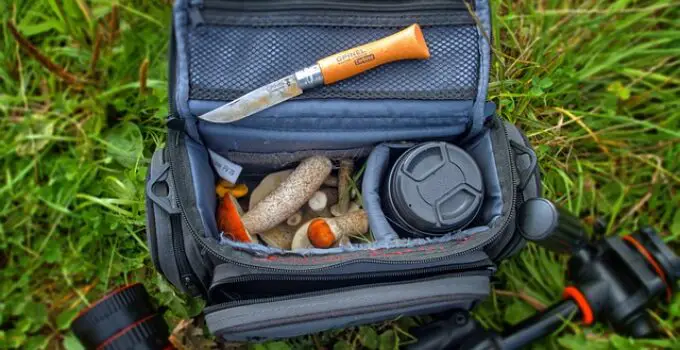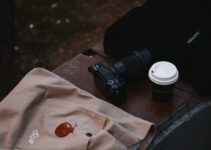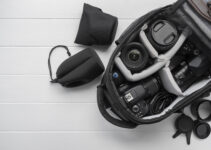As a photographer, you know how important your camera is to your craft. Protecting your camera is essential to ensure that it lasts for years to come.
However, you don’t always have the luxury of owning a dedicated waterproof camera, especially if you’re using a Fuji camera.
Fuji cameras are known for their incredible image quality and compact design. However, they are not always weather-sealed, which makes them vulnerable to water damage.
Using a plastic bag to protect your camera can save it from moisture, dust, and other harmful elements. This technique is not only inexpensive but also easy to implement.
Here’s how to do it:
In this article, we’ll show you how to protect your camera with a plastic bag, specifically for Fuji cameras.
What You Need
Before you get started, you’ll need a few things:
- A plastic bag large enough to fit your camera
- Rubber bands or tape
- A lens hood (optional)
6 Step to protect camera with plastic bag -fuji
Follow these steps to protect your camera with a plastic bag:
Step 1: Prepare the Bag
Choose a plastic bag that is large enough to fit your camera. Make sure the bag is clean and free of any debris that could scratch your lens or camera body.
Step 2: Create a Hole for the Lens
Using scissors or a knife, cut a hole in the bottom corner of the bag where the lens will go through. Make sure the hole is just big enough to fit your lens.
Step 3: Insert the Camera
Insert your camera into the bag with the lens going through the hole you just created. Pull the bag tightly around the lens hood or lens to ensure a snug fit. Use rubber bands or tape to secure the bag to the lens hood or lens.
Step 4: Cover the Camera Body
Pull the bag tightly around the camera body, leaving only the viewfinder, buttons, and dials exposed. Use rubber bands or tape to secure the bag to the camera body.
Step 5: Test the Bag
Turn on your camera and test it to ensure everything is working correctly. Take a few test shots to make sure the bag is not interfering with the camera’s functionality.
Step 6: Adjust the Bag
Adjust the bag as needed to ensure that your camera is fully protected.
Tips for Using a Plastic Bag to Protect Your Camera
Here are some tips to keep in mind when using a plastic bag to protect your camera:
- Use a sturdy plastic bag to prevent tearing.
- Make sure the bag is not obstructing any of the camera’s buttons or dials.
- If you are using a zoom lens, consider placing the bag around the lens instead of the camera body.
- Use a lens hood to protect your lens from rain and moisture.
- Avoid using the camera’s flash while it is inside the bag.
FAQs
Is it safe to use a plastic bag to protect my camera?
Yes, as long as you follow the steps outlined in this article, using a plastic bag to protect your camera is safe.
It is generally not recommended to use a plastic bag as the primary form of protection for your camera.
Plastic bags can trap moisture and humidity, potentially causing damage to your camera’s internal components. Additionally, plastic bags can create static electricity, which can also be harmful to your camera.
If you need to protect your camera from rain or moisture, it is recommended to use a waterproof camera case or rain cover specifically designed for cameras.
These products are designed to keep water and moisture away from your camera while still allowing you to operate it.
If you don’t have access to a waterproof case or rain cover, you can use a plastic bag as a temporary solution, but it is important to take some precautions.
Make sure the bag is not touching the camera lens or any of the camera’s buttons or controls. Additionally, try to avoid creating any static electricity by grounding yourself before handling the camera and the bag.
Finally, be aware that a plastic bag is not a long-term solution and should only be used as a temporary measure until you can obtain proper protection for your camera.
What type of plastic bag should I use?
If you need to use a plastic bag to temporarily protect your camera from rain or moisture, it is recommended to use a clear, resealable bag that is large enough to fully enclose your camera.
Make sure the bag is made of a thick, durable plastic material that will not tear easily. Avoid using thin, flimsy plastic bags as they can easily rip or puncture, potentially exposing your camera to water or moisture.
When selecting a bag, make sure it is clean and free from any debris or dirt that could scratch or damage your camera. Avoid using bags that have any writing or printing on them, as the ink or dyes could potentially transfer to your camera.
Remember, using a plastic bag as a long-term solution is not recommended. It should only be used as a temporary measure until you can obtain proper protection for your camera.
Can I use a plastic bag to protect my lens only?
Using a plastic bag to protect your camera lens is not recommended. But here you can see how to put dslr in camera bag.
While it may provide some level of protection from rain or moisture, there are several factors to consider.
Firstly, if the plastic bag is not perfectly clear and transparent, it can affect the quality of your images by creating distortion or a haze effect. Additionally, using a plastic bag can also increase the risk of condensation forming on the lens, especially if the bag is not properly sealed and airtight.
Instead of using a plastic bag, it is recommended to use a lens hood or a clear, protective filter that is designed specifically for your lens. These products can provide a layer of protection for your lens without compromising the quality of your images.
If you find yourself in a situation where you don’t have access to a lens hood or protective filter, and need to protect your lens from rain or moisture, a better alternative to a plastic bag would be a lens rain cover. These are specifically designed to fit around your lens, keeping it dry while still allowing you to take photos.
Conclusion
Protecting your Fuji camera with a plastic bag is an inexpensive and easy way to keep it safe from water damage, dust, and other harmful elements. By following these simple steps, you can protect your camera and continue capturing stunning images for years to come.








